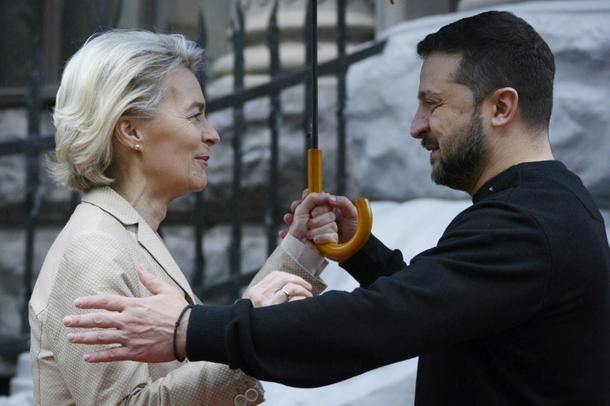Brussels to Report on Opening Door for Ukraine EU Bid
Brussels (AFP) – The EU’s executive gives its advice today on whether Ukraine is ready to begin formal membership talks. Momentum is building in favor of Kyiv’s ambition to join the bloc.
Ukraine initiated its bid to become part of the European Union shortly after Moscow’s invasion in 2022 and was officially named a candidate last June.
Now, the European Commission will deliver its verdict on whether Kyiv has successfully implemented initial reforms. The final decision, however, rests with the EU’s 27 leaders who will convene in December to determine if talks will commence.
The prevailing expectation in Brussels is that Ukraine, alongside its ex-Soviet neighbor Moldova, will receive the commission’s endorsement to proceed to the next stage.
Commission President Ursula von der Leyen lauded Kyiv on Saturday, declaring that they have surpassed “way over 90 percent” of the seven reform benchmarks outlined by Brussels. These benchmarks include combatting corruption and reducing the influence of oligarchs.
During her visit to Kyiv, von der Leyen expressed confidence that Ukraine can achieve its ambitious goal of initiating accession negotiations this year.
Nevertheless, if war-torn Ukraine receives approval, it will only mark the beginning of an arduous reform process that could take years, if not decades, before full EU membership is attained.
While Turkey began accession talks in 2005, they have since stalled. Additionally, Albania, Montenegro, North Macedonia, and Serbia are currently engaged in negotiations.
The conflict in Ukraine has revitalized the EU’s efforts to expand its membership, as the bloc seeks to counter Russian and Chinese influence.
In December, Bosnia became a candidate, and Georgia is actively pursuing candidacy, both hoping for Brussels’ support to advance.
“Stronger and More Secure”
A positive signal from the EU could provide Ukraine with a crucial boost during a challenging period. Ukrainian troops have struggled to make progress, and questions linger regarding ongoing US support.
President Volodymyr Zelensky, ahead of the report, wrote, “Ukraine will make the European Union stronger and more secure, and together we will increase stability throughout Europe.”
However, even diplomats from EU countries that strongly support Kyiv acknowledge that the December debate will be difficult. Approval to start talks may be contingent on further reforms.
Countries such as the Netherlands insist that there can be no shortcuts on the path to membership. Hungary, Russia’s closest EU ally, accuses Kyiv of restricting the rights of ethnic Hungarians.
“It’s obviously heated, difficult—if it weren’t, we’d have a compromise decision already,” said a senior European diplomat.
While optimism exists regarding a favorable outcome, it is understood that the decision will likely come with conditions and will not mark the end of the journey.
The issue of Ukraine’s membership, along with that of other hopefuls, is entwined with a more fundamental debate on how to manage the EU as it potentially expands to 30 or more members.
Admitting a war-torn nation with a population of over 40 million would entail a significant shift and considerable costs for the bloc.
Some EU members argue that the Union must reform itself before considering further enlargement. However, others fear that addressing these enormous challenges could be used as a means to delay progress in bringing Ukraine and other candidates closer.
“There are huge issues,” acknowledged one EU diplomat. “Some of them could be debated for a century without reaching a consensus.”













































